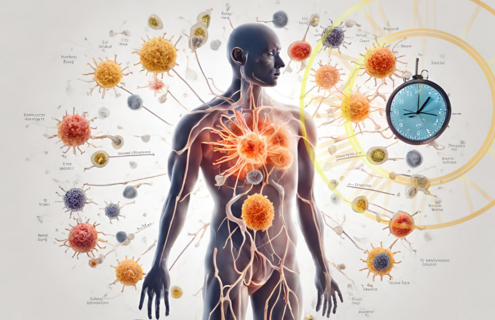
Our findings open new doors to a much more detailed understanding of the relationships between the immune system and biological age at a cellular level, and the internal and external factors that influence how quickly we age.
Ze Zhang, a recent PhD graduate from the Quantitative Biomedical Sciences program at Dartmouth’s Geisel School of Medicine.New research conducted by scientists at Dartmouth Cancer Center has shed light on the intricate relationship between the immune system and the aging process. The study, titled "Deciphering the role of immune cell composition in epigenetic age acceleration: Insights from cell-type deconvolution applied to human blood epigenetic clocks," was recently published in Aging Cell.
Epigenetic clocks, a cutting-edge tool in aging research, provide a measure of our biological age, which can differ from our chronological age. However, the underlying variation between biological age from these clocks and chronological age have remained elusive. Led by Ze Zhang, a recent PhD graduate from the Quantitative Biomedical Sciences program at Dartmouth’s Geisel School of Medicine; Lucas Salas, MD, MPH, PhD, assistant professor of epidemiology; and Brock Christensen, PhD, professor of epidemiology and molecular and systems biology, the Dartmouth Cancer Center team delved into the immune system to unravel how different immune cell profiles impact biological age estimates from epigenetic clocks to enhance their accuracy and reliability.
The study revealed that the balance between naïve and memory immune cells plays a crucial role in either accelerating or decelerating biological aging. By utilizing immune profiling tools developed since the epigenetic clocks were introduced, the researchers were able to gain a deeper understanding of the aging process at a cellular level. Their findings enable the calculation of Intrinsic Epigenetic Age Acceleration (IEAA) with unprecedented immune cell granularity, surpassing the limitations of the traditional Extrinsic Epigenetic Age Acceleration (EEAA) method.
“Our findings open new doors to a much more detailed understanding of the relationships between the immune system and biological age at a cellular level, and the internal and external factors that influence how quickly we age,” said Zhang.
Upcoming research will delve directly into different immune cells' roles in various disease settings, particularly in different types of cancer. By unraveling the complex roles of immune cells influenced by epigenetic aging, the team’s research could lead to more targeted and effective cancer treatments, a deeper understanding of how cancer develops, and new approaches for precision cancer prevention.
“This exciting trajectory can transform our understanding of disease and aging and open new possibilities in precision prevention, precision medicine, and targeted treatments,” said Zhang. “With these steps, we move closer to a future where predicting and preventing diseases like cancer becomes more precise and effective, guided by the deepened knowledge of biological age and the immune system.”
About Dartmouth Cancer Center
Dartmouth Cancer Center combines advanced cancer research at Dartmouth and the Geisel School of Medicine, with award-winning, personalized, and compassionate patient-centered cancer care and clinical trials based at the Norris Cotton Cancer Care Pavilion at Dartmouth Health's Dartmouth Hitchcock Medical Center. With 14 locations around New Hampshire and Vermont, Dartmouth Cancer Center is one of only 57 National Cancer Institute-designated Comprehensive Cancer Centers. Each year the Dartmouth Cancer Center schedules 74,000 appointments seeing more than 4,500 newly diagnosed patients, and currently offers patients more than 240 active clinical trials. Celebrating its 50th anniversary in 2022, Dartmouth Cancer Center remains committed to excellence, outreach and education. We strive to prevent and cure cancer, enhance survivorship and to promote cancer health equity through pioneering interdisciplinary research and collaborations. Learn more at the Dartmouth Cancer Center website.